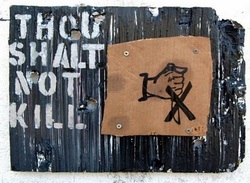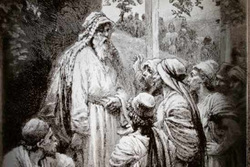 Occurrences &The DecalogueOne of the words translated as "kill" or "murder" in Hebrew is רצח (rasah). This word is often used in conjunction with two other Hebrew words associated with killing -- מות and הרג.The root of רצח occurs 38 times with nearly half the occurrences taking place in Numbers 35, which deals with the cities of refuge for accidental manslaughter. The first occurrence of rasah is in the Decalogue in Exodus 20, "You shall not Murder."Kill or Murder?While translated by the KJV as "kill" in the Decalogue a more accurate rendering of רצח in context and employed by modern translations, is "murder." The Theological Dictionary of the Old Testament notes this word is used of, "...culpable killing by use of force."Other noteworthy examples of the usage of רצח include:- This word is never used for killing in warfare or self-defense (cf. Numbers 35:27,30).
- This word is not used for suicide.
- This word is used for execution of criminals by civil authority.
- This word does not carry specificity as to the means of death.
Noting the usage of this word, we gain further insight into the commandment, "You shall not murder" in the Decalogue.
Hebrew Mnemonic for "Murder" To recall "rasah" is " he murdered" find a "sound-alike" word for "rasah." For myself, it sounds like "red sock." Associate your "sound-alike" to the definition of " he murdered." I vividly picture myself murdering a "red sock."
Biblical Hebrew Vocabulary HelpsTo learn Hebrew vocabulary and grammar quickly and easily, visit us on the web at Biblical Hebrew Made Easy! To see more works by author Blair Kasfeldt, visit his website, Boost Your Memory!Buy Your Hebrew Vocabulary Guide Today and Master over 700 Hebrew Words Quickly and Easily!
 Father in Hebrew אב (ab) or "father" is most often used in the Old Testament of a paternal father. Thought to be an "onomatopoetic" word for infants addressing their father ('abba' in Aramaic).
"Father" is also used of relationships which mirror the father-child relationship, such as the protector of the poor, "a father to the poor" (Job 29.16); those in secular government authority, "a father to the inhabitants of Jerusalem" (Isa.22:21); priests, prophets and kings (2 Kgs 6:21; Jud 18:19; 1 Sam. 24:11).Keeping this usage in mind, we see a fuller understanding of the commandment to "honor father and mother" as extending to those in authority brought to fuller exposition in the New Testament (Cf. Rom.13:2; 1 Pe 2:18; Rom. 13:1; Heb.13:17)God as Father of IsraelIsrael is God's "firstborn son" (Ex.4:22; Jer.31.9-10) and as such, the LORD is the father of Israel, the true Church. While other nations have appealed and named their god(s) as the "father" of all people and nations, only those in a covenential relationship with the Divine Father and LORD of Israel could claim such a relationship with the heavenly father (Cf. Ps.103:13).King David and the Royal LineKing David, through whom would come the promised Messiah, made appeal to the LORD as "father" in the voice of Christ: "He shall cry to Me, 'You are my Father, My God, and the rock of my salvation.' Also I will make him My firstborn, The highest of the kings of the earth." (Ps.89.26-27)The unique relationship of Father - Son the Lord shares with Jesus Christ is now shared with the Christian.Our Father who art in Heaven...While it has been said the "Lord's Prayer" could be prayed by any religious person, only a Christian may properly address God as "Father." As we have seen, only those in a covenential relationship with the LORD may call him "father." Through the merits of Christ, each baptized believer can confidently call the LORD "father." Paul writes in Romans 8:15, "For you did not receive the spirit of bondage again to fear, but you received the Spirit of adoption by whom we cry out, "Abba, Father."" and again in Galatians 4:6, "And because you are sons, God has sent forth the Spirit of His Son into your hearts, crying out, "Abba, Father!""
Hebrew Mnemonic for "Father" To recall "ab" is " father" find a "sound-alike" word for "ab." For myself, it sounds like "ave," as in "Ave Maria." Associate your "sound-alike" to the definition of "father." I vividly picture my father singing "Ave Maria"
Biblical Hebrew Vocabulary HelpsTo learn Hebrew vocabulary and grammar quickly and easily, visit us on the web at Biblical Hebrew Made Easy! To see more works by author Blair Kasfeldt, visit his website, Boost Your Memory!Buy Your Hebrew Vocabulary Guide Today and Master over 700 Hebrew Words Quickly and Easily!
 "He Remembers" - EtymologyIn Klein's "Etymological Dictionary of the Hebrew Language" we learn the origin of זכר (zacar): "According to some scholars the orig. meaning of this base wold have been 'to prick, pierce', whence 'to fix in one's mind' — 'to remember.'"
"Remember" An Internal and External ProcessAlthough "remembering" for Americans' is often a simple cognitive process, it is sometimes linked with action. Such as looking at your watch and thinking, "I just remembered I have to pick up my kids from practice!"For the Hebrew "to remember" included vocalizing that remembrance and also taking action. This is clearly demonstrated in the commandment to "Remember (zacar) the Sabbath day to keep it holy." in Exodus 20.8. Physical "reminders" such as having tassels on their garments moved the Hebrew to mindful of his relationship with God and His commandments (Numbers 15:40).The vocalization of "remembering" can be found in Jonah's rememberance which leads him to prayer (Jon. 2:7 ff). Harris notes in the Theological Wordbook of the Old Testament, "If the possibility of meanings such as "recite" or "invoke" is accepted, the "remembering" of God's wonderful works could be a public recitation of those deeds (I Chr. 16:12; cf. v.8: "make know his deeds:; see also Ps 105:5; RSV "remember")..."
In God's Remembrance He Takes Action The greatest remembrance is God's remembrance of us. When God's "remembers" us, He takes action. For instance, when God remembers His covenant with His people and Church, He delivers His people. In bondage to the Egyptians, the Hebrews groan unto the LORD, "So God heard their groaning, and God remembered His covenant with Abraham, with Isaac, and with Jacob." God then takes action to deliver His people.
In Christ, God "remembers" His Church and delivers us from what Martin Luther coined the "unholy trinity" -- sin, death and the devil.Inversely, for God to not remember often means that He grants us forgiveness. Psalm 79:8-9 reads, "Oh, do not remember former iniquities against us! Let Your tender mercies come speedily to meet us, For we have been brought very low. 9 Help us, O God of our salvation, For the glory of Your name; And deliver us, and provide atonement for our sins, For Your name's sake!" Hebrew Mnemonic for "He Remembered" To recall "zacar" is " he remembered" find a "sound-alike" word for "zacar." For myself, it sounds like "the car." Associate your "sound-alike" to the definition of " he remembered." I vividly picture myself remembering where I parked "the car."Biblical Hebrew Vocabulary HelpsTo learn Hebrew vocabulary and grammar quickly and easily, visit us on the web at Biblical Hebrew Made Easy! To see more works by author Blair Kasfeldt, visit his website, Boost Your Memory!Buy Your Hebrew Vocabulary Guide Today and Master over 700 Hebrew Words Quickly and Easily!
|



 RSS Feed
RSS Feed